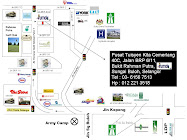Having read the recent spate of articles on the importance of the Chinese language and culture, I feel compelled to share my views and experiences.
The education system of learning English as the first language and Chinese (or other mother tongues) as the second language started in my generation.
As I grew up in a Mandarin-speaking family, my grades for English were dismal throughout my primary and secondary school years. But I never failed to score distinction in the Chinese language.
My parents and even I myself became worried about my poor command of the English language. Still, as far as the Chinese language is concerned, I've always taken pride in my excellent results.
Needless to say, I had problems communicating effectively with my colleagues in English when I began working. Fortunately, as my job often took me to Asian countries and required me to deal a lot with Americans, my English soon improved by leaps and bounds. However, that has not stopped me from continuing to speak Mandarin whenever possible and writing in Chinese to my family members and friends.
My view is that Singaporeans should be proficient both in the English language and their mother tongue, whether it is Chinese, Malay or Tamil. English is our working language, while Chinese, Malay, or Tamil each plays an important role of preserving the cultural heritage of the different races. And after all, we are a multi-lingual society.
I'm now studying for a bachelor's degree in Sydney. Many Westerners whom I've met are surprised that I can speak both English and Mandarin fluently. Some Australians thought I must have lived there for at least a few years when I have in fact been there for only six months!
On the other hand, people from China and Taiwan are amazed that I speak Mandarin as well as they can.
Whenever I'm asked the question why I am able to master two languages, I'm always proud to say: “Because I'm a Singaporean!”
Singapore is a multi-racial country and Singaporeans are encouraged to be bilingual or even multi-lingual. This actually prepares us well for the challenges that we face. English has served us well for years as the language of commerce and will continue to do so. But as China looks set to become an economic powerhouse, the Chinese language will now help us ride the dragon.
(The writer is a Singaporean undergraduate studying in Sydney.)
阅读了报章最近许多有关华文华语和华族文化的讨论,很想和大家分享我的经验和看法。
以英文为第一语文,华文和其他母语为第二语文的政府教育政策,由我这一代开始。
我生长在一个用华语沟通的家庭,所以,从小学到中学,我的英文水平总是差强人意。但是,我的华文成绩却一直是顶呱呱的。
我的父母,甚至是我自己,都对我掌握英文的能力感到担忧。尽管如此,我却一直为自己在华文的优异表现引以为荣。
刚踏入社会工作时,因为英语不灵光,我时常不能有效地和同事交换意见。幸好因为工作需要,我经常出差到东南亚国家,也不时必须和美国人交谈,我的英语因此进步神速。不过,我依然不放弃任何讲华语的机会,也继续以华文同家人和朋友作书面沟通。
我认为新加坡人应该通晓英文和母语——不论是华文、马来文或淡米尔文。英语长久以来是我们的工作语言,母语却在个别种族保持和延续各自文化的工作上,扮演了重要的角色。另外,新加坡毕竟是一个多元语文的国家。
我目前在悉尼修读学士学位。很多我刚认识的洋人,都因为我能够讲英语和华语而感到讶异。我流利的英语,甚至让一些澳洲人以为我一定已经在那住上好几年了。事实上,我在悉尼才不过六个月!
另一方面,一些来自中国大陆和台湾的华人,却因为我和他们一样说得一口漂亮的华语感到惊奇。
每当人们问我为什么能够同时掌握两种语文时,我总是回答说:“因为我是新加坡人!”
新加坡是一个多元种族社会,政府的双语政策鼓励人们通晓两种语文,甚至更多种语文。这其实有助于我们为将来所要面对的挑战作好准备。
做为商业用语的英文,使我们能够和西方国家沟通,多年来为我们的经济发展作出了巨大的贡献,将来仍然会继续扮演着重要的角色。
另外,中国崛起成为世界经济强国势不可挡,将大大加强华文华语的经济效益,掌握好华文华语将帮助我们搭上中国的经济快车。
skip to main |
skip to sidebar



pusattuisyenkitacemerlang@yahoo.com
We provide 1. Quality Teaching To Encourage Your Child's Learning Desire. 2. Quality Learning To Build Your Child's Self Confidence. 3.Quality Growing To Shape Your Child's Future. Email: pusattuisyenkitacemerlang@yahoo.com
Principal

Motivator and Academic Counselor

Location

pusattuisyenkitacemerlang@yahoo.com
Sharing Subjects
- Adat Melayu (6)
- B.Melayu - Karangan (1)
- KC 伟 杰 课 室 (25)
- KC 伟 杰 课 室 Proverb (17)
- KC 伟 杰 课 室 Reborn (15)
- KC 伟 杰 课 室- Travel (1)
- KC 伟 杰 课 室-出国留学 (14)
- KC 伟杰课室 - 教育 (10)
- KC 伟杰课室学习 (8)
- Kita Cemerlang (12)
- Kita Cemerlang - Sharing (106)
- Kita Cemerlang 雙溪毛糯- Work? (10)
- Komsas (6)
- Math Reference Tables (10)
- Maths Olympics (8)
- Photos (4)
- PMR - BM作文 (12)
- PMR - 华文 (17)
- PMR - 华文作文 (25)
- PMR - 英语 (1)
- PMR - 英语作文 (6)
- PMR-华语-孔子 (4)
- Science - Chemistry (9)
- SPM - B. M-Tatabahasa (2)
- SPM - BM作文 (20)
- SPM 华文 (4)
- SPM 华文作文 (3)
- STPM 华文 (4)
- STPM 华文作文 (1)
- Teacher (7)
- UPSR - 华语 (2)
- UPSR - 华语作文 (54)
- UPSR - 成语故事 (9)
- UPSR B.English (13)
- UPSR B.English - Grammar (28)
- UPSR B.English - Story (7)
- UPSR B.English Essay (16)
- UPSR B.M- Nilai Murni (5)
- UPSR B.Melayu (3)
- UPSR B.Melayu - Karangan (15)
- UPSR B.Melayu - Tatabahasa (20)
- UPSR Mathematic (11)
- UPSR- 华语 (39)
- UPSR- 华语古文 (21)
- UPSR- 科学 (17)